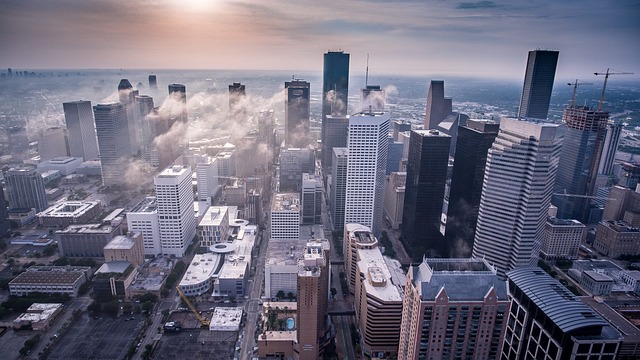Karachi, Pakistan's largest city, faces severe noise pollution from traffic, construction, and public gatherings, negatively impacting residents' quality of life and health. In Frere Town, factors like peak-hour traffic congestion, construction activities, and vibrant markets contribute to elevated noise levels. High noise exposure poses health risks including stress, sleep disturbances, and hearing loss, particularly for children and the elderly. The city has implemented regulatory measures, setting decibel limits and enforcing them through monitoring and penalties. Strategies for a quieter Karachi include enhanced urban planning with sound-absorbing materials, strategically placed green spaces, awareness campaigns, and stricter noise regulations.
Karachi, Pakistan’s bustling metropolis, faces a silent yet pervasive challenge—noise pollution. This article delves into the intricate web of factors contributing to the city’s high noise levels, from traffic congestion to industrial activities. We explore the profound impact on residents’ well-being and the environment, highlighting the urgent need for effective solutions. By examining current regulations and past efforts, we propose innovative strategies to foster a quieter and more livable Karachi, ensuring a better quality of life for its diverse population.
- Understanding Noise Pollution in Karachi: A Brief Overview
- Key Factors Contributing to High Noise Levels
- Impact of Noise on Karachi's Residents and Environment
- Current Regulations and Efforts to Control Noise Pollution
- Potential Solutions and Future Strategies for a Quieter Karachi
Understanding Noise Pollution in Karachi: A Brief Overview

Karachi, as Pakistan’s largest city and a bustling metropolis, faces a significant challenge in managing noise pollution. The constant hum of traffic, construction activities, and public gatherings contribute to an overall elevated sound level, impacting the quality of life for its residents. Understanding this issue is crucial for implementing effective solutions.
Noise pollution in Karachi is a complex problem, especially in densely populated areas where various sources merge. From bustling streets and industrial zones to lively markets and construction sites, every corner of the city echoes with sounds that often exceed safe decibel limits. This constant exposure can lead to health issues like hearing loss, stress, and sleep disturbances, making it essential to address noise levels for a healthier Karachi.
Key Factors Contributing to High Noise Levels

In Karachi, noise levels in Frere Town are significantly influenced by several key factors. One major contributor is traffic congestion, particularly during peak hours when vehicles queue up on narrow roads, creating a constant rumble that permeates through residential areas. Additionally, construction activities play a substantial role, with ongoing building projects generating loud noises from machinery and heavy equipment operations.
Another critical factor is the dense population density of Frere Town. With limited green spaces and a high concentration of businesses and industries, sound pollution escalates due to amplified noise from markets, factories, and crowded streets. Moreover, social gatherings and cultural events in the area often extend late into the night, contributing to persistent noise levels that impact nearby residents’ sleep patterns and overall well-being.
Impact of Noise on Karachi's Residents and Environment

The constant hum of traffic, construction sites, and bustling markets contributes to Karachi’s high noise levels, affecting its residents’ quality of life. Prolonged exposure to excessive noise can lead to various health issues such as stress, sleep disturbances, and even hearing loss. Children and the elderly are particularly vulnerable, making it imperative for the city to address this pressing concern.
Moreover, the environmental impact cannot be overlooked. Noise pollution disrupts ecosystems, affecting wildlife and their habitats. In Karachi, where many residents live in dense urban areas, the constant din can create a stressful living environment, negatively impacting mental health and overall well-being. Therefore, mitigating noise levels is crucial for creating a healthier, more livable city for all its inhabitants.
Current Regulations and Efforts to Control Noise Pollution

In Karachi, the bustling metropolis of Pakistan, noise pollution has been a growing concern for residents and environmental advocates alike. However, the city has also witnessed efforts to combat this issue through regulatory measures. The current noise control regulations in Karachi aim to set specific decibel limits for various areas, including residential, commercial, and industrial zones. These rules are designed to ensure that noise levels do not exceed safe thresholds, particularly during nighttime hours.
Local authorities have been actively implementing these regulations by conducting regular noise monitoring and enforcing penalties on establishments that violate the set standards. Additionally, awareness campaigns play a crucial role in educating citizens about the impact of noise pollution and promoting responsible behavior. Such initiatives are essential steps towards creating a quieter and more livable environment for the diverse population of Karachi.
Potential Solutions and Future Strategies for a Quieter Karachi

To create a quieter and more livable Karachi, several potential solutions and future strategies can be implemented. One key approach is to enhance urban planning by incorporating sound-absorbing materials in construction, particularly in dense areas where noise pollution is exacerbated. Green spaces and parks can be strategically placed to act as natural buffers against noise, promoting a healthier and more peaceful environment for residents.
Additionally, raising awareness about the impact of noise pollution among Karachi’s citizens can foster a collective responsibility. This includes promoting quieter alternatives in daily activities, such as using electric lawnmowers instead of gas-powered ones or adopting quieter transportation options. Future strategies could involve implementing stricter noise regulations and utilizing advanced technology for noise monitoring and control, ensuring that Karachi moves towards a quieter and more sustainable urban future.
Karachi, known for its bustling streets and vibrant culture, faces a significant challenge in mitigating noise pollution. By identifying key contributors such as traffic congestion, construction activities, and social gatherings, we can better address the impact on residents’ well-being and environmental health. Current regulations offer a starting point, but more stringent enforcement and innovative solutions like sound barriers and quieter transportation are essential for a quieter future. Through collective efforts, Karachi can strive to create a more peaceful urban landscape that enhances the quality of life for its diverse population.



